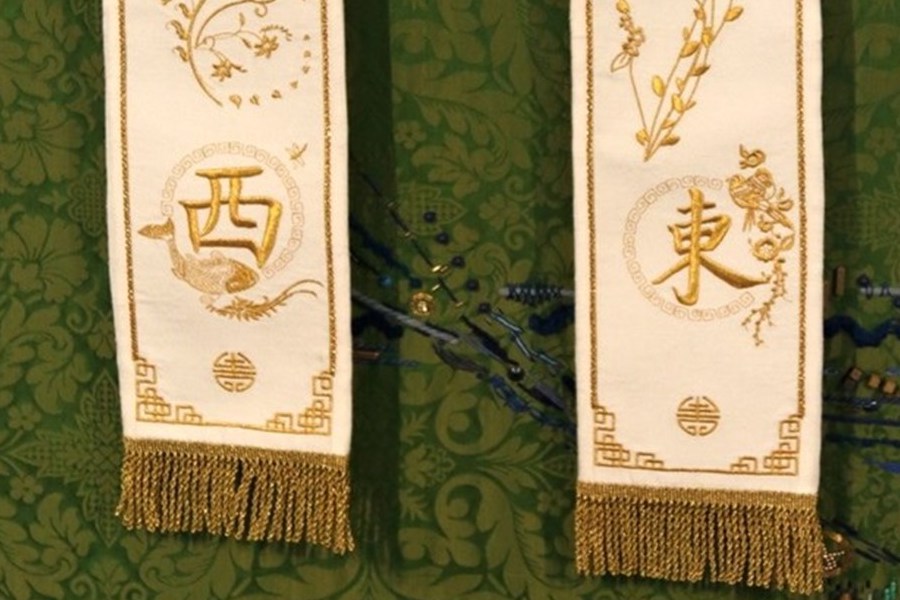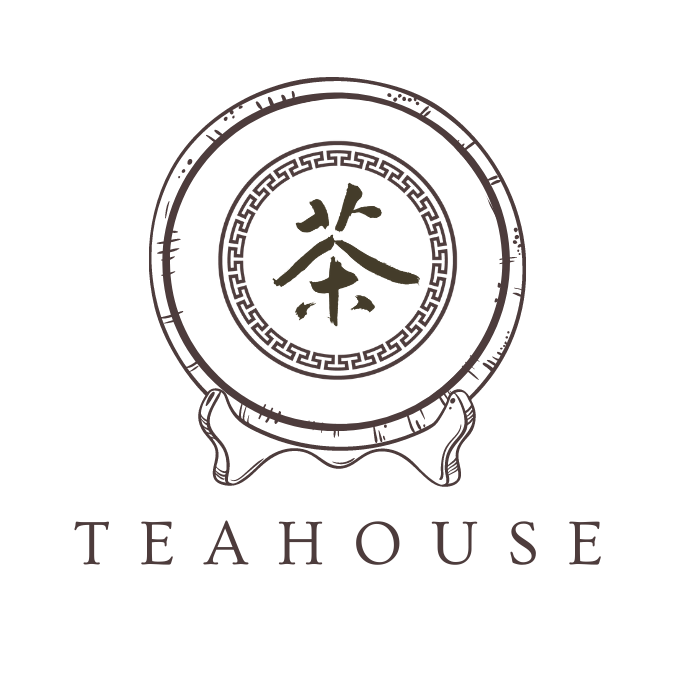
06 Nov A Unique Ordination Stole
A unique ordination stole represents reconciliation in Christ and the coming together of East and West. This article was written by Maddy Fry and originally appeared in The Church Times on 06 November 2020 [link to article]
A BRITISH-CHINESE curate in Bristol is using his clerical vesture to pay tribute to both his heritage and his late father. The Revd Mark Nam, a 39-year-old deacon and Assistant Curate at St Anne’s, Oldland, and the United Church in Longwell Green, has marked his vocational journey by crowd-funding a custom-made clerical stole for his ordination.
The unique design features two Chinese symbols embroidered in gold thread on each end of the stole, one meaning “East” and the other “West”.
For Mr Nam, the project has personal and global significance, and represents his hopes that his family’s journey of identity and faith might contribute to a better dialogue on racial issues in the Church.

“I’m third-generation Chinese. My parents were both born in Britain, and I was born and raised mostly in Wales, even though I grew up partly in Hong Kong. My grandparents came to Britain in 1920, after my grandfather got on a boat that he’d been told by his brother was going to America.”
Mr Nam’s grandfather’s journey ended in Birkenhead, near Liverpool, instead of Chicago. He and his wife moved to Wales, and ran a laundrette, before moving into the restaurant business. He never saw his brother again.
Knowing about his grandfather’s struggles left Mr Nam with a strong sense of the dislocation and identity-confusion running through his family. He felt this particularly keenly at school: “I experienced a lot of racism while I was a teenager in Newport. I never felt while growing up that I was proud to be Chinese.”


HE WAS raised an Anglican, attending Church in Wales services, although a spiritual home in Britain remained elusive. There are few Chinese Anglicans in the expat community, while the more overtly Chinese churches left little space for those whose identity was more mixed. The choice, he felt, was either to “stick around or fall away”.
After a period spent back in Hong Kong, Mr Nam relocated to Bristol in 2016, with his wife, Kayi, and their two daughters, to train for the priesthood at Trinity College. A Church Times article about issues in black and minority-ethnic recruitment among the clergy (11 November 2016) sparked a conversation with the Principal of the college at the time, Dr Emma Ineson (now Bishop of Penrith). He started to feel more reconciled to both sides of his heritage.
His father’s offer to buy his stole as an ordination gift inspired the idea of including the East and West symbols to mark his new-found sense of peace, as well as the burgeoning feeling that he could be a role-model to other Chinese Anglicans.
Mr Nam’s father died following surgery earlier this year. (His mother had died when he was 20.) The funeral was held two days before the ordination service at Bristol Cathedral, in October.
“My father was proud of me becoming one of the first British-born Chinese priests. His passing really inspired me to make the stole happen; so I decided to crowdfund it. A stole would normally cost £200 or £300, but a custom-made one is closer to £500.”
Mr Nam and Kayi sketched out the design in February, sending it to a Chinese, Bristol-based design consultant, Colse Leung. The finished design was sent to Juliet Hemingray, and the process of making the stole went ahead in July. Mr Nam received the finished garment in October.
The choice of gold was significant: in Chinese culture, it symbolises wealth, good fortune, and nobility. Mr Nam said: “The nobility, lordship, and sovereignty of Christ are what I wanted to emphasise.” The birds and fish next to the characters have biblical echoes in terms of mission and God’s provision, while the dragonfly, also included, is a Chinese symbol of new beginnings.
His worries about whether people would be supportive were unfounded. The campaign total exceeded the cost of the stole: £1760 was raised in 28 days.
Mr Nam plans to spend some of the remaining funds from the crowdfunder on a portable communion set, besides creating and framing a list of the names of every donor to go on the wall of his house. The rest will go towards continuing the work that he started when he set up a BAME group at Trinity College.
“I’m hoping to set up a small charitable trust next year to bless future East Asian ordinands and clergy. My hope is that it will be a way for people to form connections. I found it incredibly difficult to find other East Asian clergy for support and guidance when I was going through the discernment process, and I would like to see that changed. I have found a number of people who see this as a worthwhile endeavour, and are willing to contribute to it.

“For so long, I felt that I was never proud to be Chinese, but the stole represents feeling reconciled to myself, and the healing of those old wounds. The East-West symbolism represents the idea that
our reconciliation is found in and through Christ. East and West are often seen as polar opposites, but they can find unity here. It symbolises that we shouldn’t forget that our hope is found through Christ.”
ANOTHER source of inspiration came from the ministry of Florence Li Tim-Oi, the first woman to be ordained priest in the Anglican Communion, in 1944. “She blazed a trail, and I’m grateful for that. I feel like my ministry should be about ‘being’ rather than just ‘doing’, which means embracing my heritage.”
This includes encouraging East Asians to be a more visible presence in the Church. Although Mr Nam welcomed the launch of the Church of England’s Racism Taskforce in mid-October (News, 14 October), he expressed disappointment that no East Asians were represented on it. This was particularly relevant given how, on the same day as the Taskforce was launched, Parliament held its first debate in the Commons on the racist abuse that some groups had experienced after the coronavirus emerged from China.
“There’s a lot of tension between China and the West at the moment, but people need to understand that the ones suffering from racism are just your ‘average Joe’ East Asians you meet in the street,” Mr Nam said.
“I’m concerned that the remit for next year’s Racism Action Commission won’t have someone bringing the concerns of East Asian people into the discussion. The Church of England might not be able to speak into these issues as effectively as it could, and it shouldn’t fall behind and miss the boat again.
“Discussions around racism often become too polemical, but I still feel the body of Christ is poorer without diversity. Black Lives Matter is important, and the voice of the East Asian community can triangulate the issue, which brings in the Trinitarian image of the cross. It is therefore not just about being East Asian: it’s about adding an extra angle. The Church needs everyone.”
The number of clergy from East Asian backgrounds remains small. Mr Nam had not found any of their names in Crockford’s Clerical Directory, and said that he could count the ones he knew on barely two hands.
“Ordination is a process of ‘becoming’: it’s a journey; so, although I feel like I’m a link in a chain, I don’t feel the pressure to be a certain way,” he said. He no longer has any doubts about his place: “Even those of us who are caught between cultures can still be one in Christ. That’s why the stole brings together East and West, and everything in between.”



Sorry, the comment form is closed at this time.